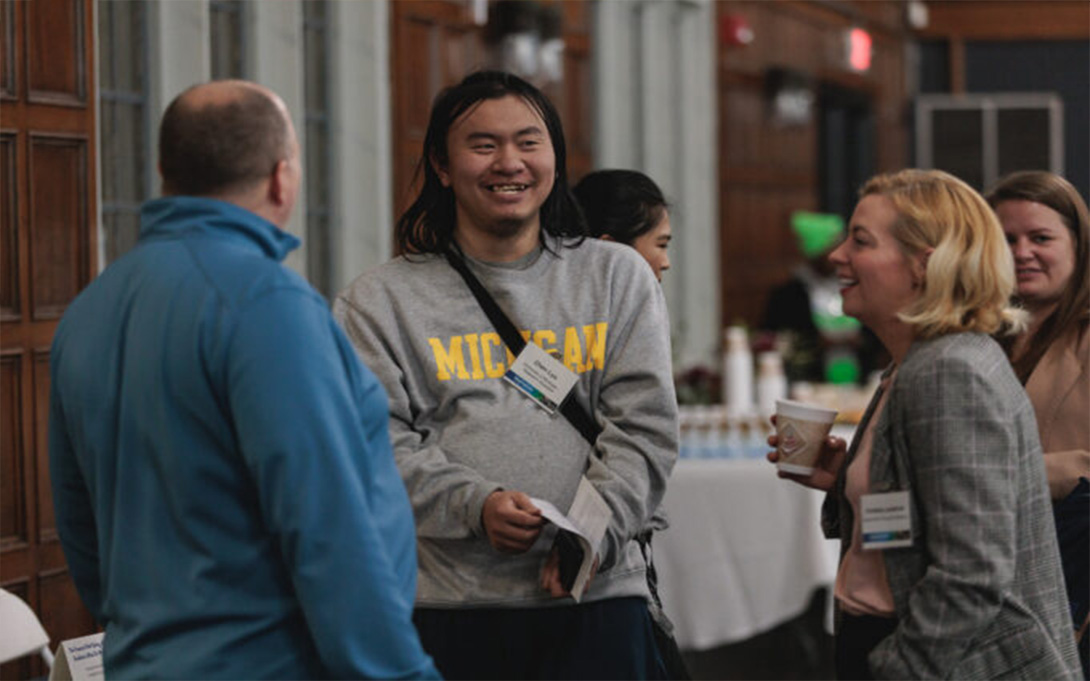
Getting money into the savings accounts of some Detroiters is more challenging than one might think. Before people can think about long-term financial planning, they need their immediate needs met. And those opening bank accounts for the first time may face hurdles gathering the necessary personal identification documents.
These were some of Communities First’s takeaways from a small-scale pilot of its new Family Mobility Savings Program that deposited money into savings accounts for eight people as compensation for completing financial literacy and job readiness tasks. Communities First was one of 16 teams participating in the Detroit Financial Well-Being Innovation Challenge that shared their progress so far at a showcase event on Friday, April 28, hosted by GreenLight Fund at Durfee Innovation Society.
The five-year challenge that launched in February 2022 is run by United Way for Southeastern Michigan in partnership with the University of Michigan’s Poverty Solutions, whose research on the financial well-being of Detroiters motivated the challenge. Six to eight of the project teams will be selected this summer to continue to the pilot stage, where they will receive additional funding and technical assistance to start implementing their ideas.
“Not all of the organizations are going to make it to the next phase. But an event like this is really important because it helps to generate outside interest in these pilots so they can explore other paths to move forward on,” said Leonymae Aumentado, strategic projects manager at Poverty Solutions, who supports the implementation of the challenge.
At the showcase, Communities First staff outlined their plans to enroll 100 people in a six-month pilot of the Family Mobility Savings Program. To help them prepare to expand the savings program, U-M Poverty Solutions research assistant Nick Voelkner identified and analyzed barriers to financial security for Detroiters, including banks’ reliance on consumer reporting agencies to screen potential patrons, predatory lenders, overdraft fees, people’s distrust of banks, and low levels of financial literacy.
“It was really helpful and gave us different eyes to look at things,” said Ashley Stozier, family mobility coordinator at Communities First. “I’m not a data person. I’m person-to-person. The data gave me different things to aim for.”
In all, 14 Poverty Solutions research assistants provided support to Financial Well-Being Innovation Challenge teams, gathering information on topics ranging from community land trusts to demographics of Black workers in Detroit and the barriers faced by small business owners and entrepreneurs.
“The goal for the research assistants doing this work is to support the organizations,” said Aumentado, who oversaw their work. “I also saw it as an opportunity for the research assistants to build a set of skills that are going to be useful to them if they want to work in this type of space.”
Voelkner (MSW ‘23), a Brighton native, addressed research questions for Communities First as well as Southwest Economic Solutions and GenesisHOPE. This was his first time working on financial well-being issues, and he was struck by how many banking policies benefit only the financial institution while negatively affecting people’s ability to accumulate savings.
“Everything I’ve learned from Poverty Solutions has been so helpful,” Voelkner said. “It’s not only the memo writing, but how to structure it and convey information in a way that’s accessible and understandable and how to select information that’s really relevant.”
Kyra Reumann-Moore (MPA ‘23), originally of Philadelphia, said she also appreciated the experience she gained writing policy memos and analyzing qualitative research. She worked on research questions for the National Black Worker Center, a Black workers’ rights advocacy organization with 10 centers across the country and nine more centers in an incubation phase.
The organization is exploring opening a Detroit location, so Reumann-Moore gathered information on Black worker demographics, employment levels, and wages in Detroit as well as the history of the local labor movement and the migration of Black workers to Detroit. The research memo was so helpful that LaRonda Schenck Scott, development director for the National Black Worker Center, said she’s interested in having Reumann-Moore complete similar research for the other nine cities incubating Black Worker Centers.
“I gained a lot of knowledge that will be transferable to how I go about understanding the context of different cities,” Reumann-Moore said. “I love how community-centric the challenge is and how they are trying to improve the financial well-being of Detroiters based on what they’re hearing from residents.”
This story was written by Lauren Slagter of Poverty Solutions.